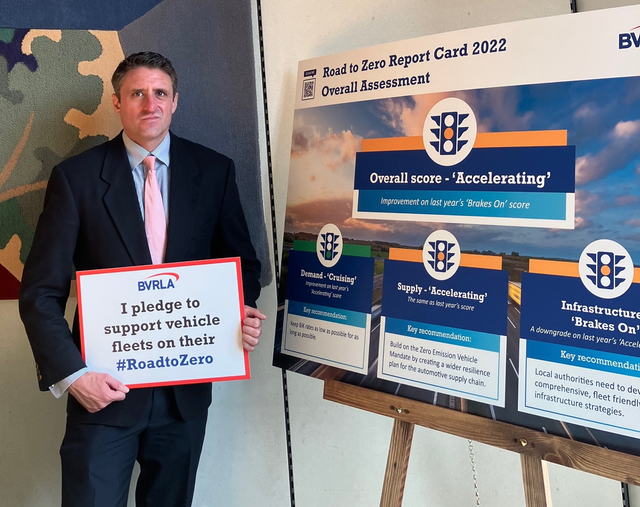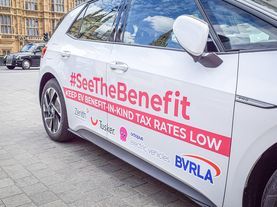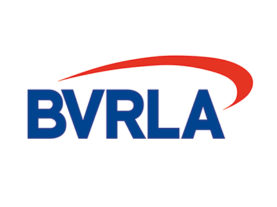The association's #SeeTheBenefit campaign has secured government support for the vital car tax regime for EVs
What is Company Car Tax?
Benefit-in-Kind tax rates, known as the Company Car Tax (CCT) regime is one of the Government’s most powerful tools in influencing the behaviour of businesses and individuals. A fair, consistent and well-signalled system can play a vital role in helping the government to meet its air quality improvement goals. The Treasury has a tremendous opportunity to accelerate this process and accentuate the results with smart use of the CCT regime.
BVRLA members welcomed the announcements at Budget 2020 of a rate freeze on BiK for 2023-24 and 2024-25. This gave the sector the five years of foresight that had been requested. Combined with the BiK incentives for battery electric vehicles (BEVs), it was an extremely powerful piece of policymaking. The low BiK rate for BEVs and certainty around this rate for the entire period of a lease has fundamentally transformed the UK market for BEVs. It has allowed leasing companies to effectively market the cost of ownership benefits of choosing BEVs. The result is that BEVs were responsible for 21% of member company car registrations in the three months to October 2020.
Company Car Tax & Electric Cars
Electric Vehicles (EVs) benefit from low company car tax rates. This means that despite electric cars being more expensive than petrol or diesel options drivers are able to make the transition. This benefit is not just open to business users though, through salary sacrifice arrangements an ever-growing number of employees can access EVs at affordable monthly costs.
Brand new, safe and zero-emission pure electric cars are in reach for more people than ever before. Over 60% of salary sacrifice drivers are 20% taxpayers, the tax approach is democratising the transition to Net Zero. In time, as these vehicles feed the second-hand market, the democratisation will gain further momentum so that electric vehicles will be available to all drivers.
Why are we campaigning?
Instrumental in this policy success has been the foresight provided by the Government on future tax rates, but we are now in a position where rates are only known up to 2024/25. Beyond this the Government’s intentions aren’t clear. The BVRLA are calling on the Government to provide as much foresight on future rates as possible and to keep the tax on electric vehicles down to continue this massive success story.
A welcome boost for BVRLA members
The #SeeTheBenefit campaign (see below) was targeting the Autumn Statement from the Chancellor, asking for electric company car tax rates to remain low and for the market to be given clarity on future rates.
In the statement on 17 November, those asks were met, with Jeremy Hunt announcing that the Benefit in Kind rate for EVs would increase by 1% a year from 2025 for three years. When delivering the statement in the Houses of Parliament, the Chancellor directly cited the work of industry bodies in influencing the move.
#SeeTheBenefit campaign launch
On 13th July the BVRLA and member representatives from Tusker, Zenith and Octopus EV hosted a drop-in event outside the Houses of Parliament to educate MPs on the merits of salary sacrifice schemes and the urgent need to ensure future clarity of BiK rates and to keep these taxes low for EVs. Read the press release.
Thank you to the over 1,200 supporters who took the time to email their MP ahead of the event asking them to attend and find out more. Use the form above to email your MP about the next stage of the campaign.
View a list of MPs who attended our campaign launch outside Parliament
Thank you to the following MPs for meeting with the BVRLA and members on 13th July to find out more about our #SeeTheBenefit campaign calling for BiK foresight and keeping these tax rates low for EVs.
- Alex Davies-Jones, Labour MP for Pontypridd
- Bill Esterson, Labour MP for Sefton Central
- Catherine Mckinnell, Labour MP for Newcastle upon Tyne North
- David Duguid, Conservative MP for Banff and Buchan
- Fleur Anderson, Labour MP for Putney
- Michael Fabricant, Conservative MP for Lichfield in Staffordshire
- Peter Bottomley, Conservative MP for Worthing West
- Taiwo Owatemi, Labour MP for Coventry North West
- Abena Oppong-Asare, Labour MP for Erith and Thamesmead
- Andrew Jones, Conservative MP for Harrogate and Knaresborough
- Chris Elmore, Labour MP for Ogmore
- Chris Evans, Labour (Co-op) MP for Islwyn
- Sir Bill Wiggin, Conservative MP for North Herefordshire
- Carol Monaghan, Scottish National Party MP for Glasgow North West
- Desmond Swayne, Conservative MP for New Forest West
- Emma Lewell-Buck, Labour MP for South Shields
- Gavin Newlands, Scottish National Party MP for Paisley and Renfrewshire North
- Greg Smith, Conservative MP for Buckingham
- Ian Byrne, Labour MP for Liverpool, West Derby
- Kevin Brennan, Labour MP for Cardiff West
- Kim Johnson, Labour MP for Liverpool, Riverside
- Kim Leadbeater, Labour MP for Batley and Spen
- Margaret Ferrier, Independent MP for Rutherglen and Hamilton West
- Navendu Mishra, Labour MP for Stockport
- Nia Griffith, Labour MP for Llanelli
- Paul Maynard, Conservative MP for Blackpool North and Cleveleys
- Paula Barker, Labour MP for Liverpool, Wavertree
- Rachel Hopkins, Labour MP for Luton South
- Rupa Huq, Labour MP for Ealing Central and Acton
- Stephen Metcalfe, Conservative MP for South Basildon and East Thurrock
- Stephen Timms, Labour MP for East Ham
The next phase
In the run up to Jeremy Hunt's first major fiscal event as Chancellor, the BVRLA briefed dozens of MPs on the vital salary sacrifice market. The drop-in event at the Houses of Parliament was synchronised with the arrival of more than 160 letters from industry professionals, calling on the new Chancellor to keep tax rates on electric company cars low.
The association also issued an Open Letter to the Chancellor on behalf of more than two million UK workers that are currently eligible for an electric salary sacrifice car. The letter was cosigned by leading salary sacrifice providers, as well as other trade bodies and NGOs.






